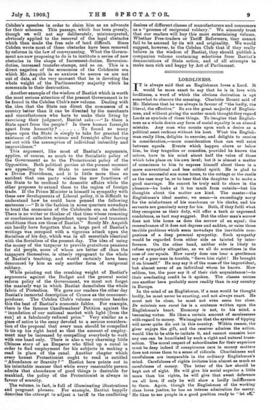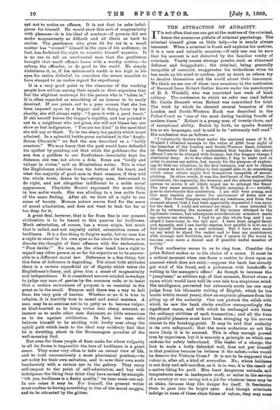LORDLINESS.
IT is always said that an Englishman loves a Lord. It would be more exact to say that he is in love with lordliness, a word of which the obvious derivation is apt somewhat to obscure the meaning. Charlotte Bronte said of Mr. Helstone that he was always in favour of "the lordly, the liberal, the effective." So are the great majority of English- men, and without giving the matter much thought they regard Lords as symbols of these things. To imagine that English- men as a whole desire any form of social equality is an absurd mistake. Any man who counts upon such a desire as a political asset reckons without his host. What the English- man really likes, delights to exercise, and delights to receive is consideration,—more consideration than can well exist between equals. Events which happen above or below him, be they tragedies or comedies, provided be knows the actors, have in his mind about half the value of those which take place on his own level; but it is almost a matter of conscience to him to express himself about them in a more conventional and less critical spirit. He is glad to see the successful son come home, to the cottage or the castle as the case may be, or to hear that the daughter is to make a good marriage. He cannot be truly said to share in the pleasure—he looks at it too much from outside—but his thoughts about the matter are kind. The master—the Englishman's ideal master, we mean—is exceedingly sorry for the misfortunes of his coachman or his clerks, and his servants are genuinely sorry for his. Both, if they fulfil what they recognise as their duty, will offer a tacit or expressed condolence, as tact may suggest. But the other man's sorrow does not bite home as does the sorrow of an equal ; the remembrance of it does not depress and sadden, or raise those terrible problems which seem nowadays the inevitable com- panions of a deep personal sympathy. Such sympathy would be regarded from either side as tainted by inter- ference. On the other hand, neither side is likely to refuse sympathy altogether, as we all do sometimes in the case of our equals. How rarely does one hear a gentleman say of a poor man in trouble, "Serve him right ! He brought it on himself." He may say it of the mass of the improvident, but almost never of an individual whom he knows. How seldom, too, the poor say it of their rich acquaintance !—to their everlasting credit be it spoken. The classes excuse one another here probably more readily than in any country in Europe.
In the mind of an Englishman, if a man would be thought lordly, he must never be exacting, and not always exact. He must not be close, he must not even seem too close. De minimis non carat le x is a sentence written upon the Englishman's heart. Economy is not, to his mind, a becoming virtue. He likes a certain amount of carelessness with regard to money. We imagine that the system of tipping will never quite die out in this country. Within reason, the giver enjoys the gift, and the receiver admires the action, would like to be able to imitate it, and cannot conceive how any one can be humiliated by such a right and natural trans- action. The moral respect of subordinates for their superiors must be deep indeed if conspicuous care in money matters does not rouse them to a sense of ridicule. Churlishness and carefulness are inseparable in the ordinary Englishman's mind. Carefulness of rights irritates him almost as much as carefulness of money. The letter of the law should be kept out of sight. He will give his social superior a little more than his rights, he will give that sweet deference we all love, if only he will show a lordly indifference to them. Again, though the Englishman of the working class loves justice, he has an intense admiration for mercy. He likes to see people in a good position ready to "let off," apt not to notice an offence. It is not that he asks indul- gence for himself. He would show this sort of magnanimity with pleasure—it is his ideal of conduct—if poverty did not snake magnanimity so difficult and all ideals so hard to realise. The gentleman who gives tit for tat in a small matter has " evened " himself in the eyes of his audience; in fact, has forfeited the right to consider himself superior. It is no use to tell an uneducated man that the gentleman brought that small offence home with a worthy motive,—to reform the offender, or do good to the world. He simply disbelieves it, or, if his informant's credit is too high in his eyes for entire disbelief, lie considers the severe moralist to have stooped to an undue regard for expediency.
It is a very good point in the character of the working people bow seldom among their equals or their superiors they feel the slightest contempt for the person who is "taken in." It is often regarded as something of an honour to be easily deceived. If one points out to a poor woman that she has been imposed upon by a beggar and is doing harm by her charity, she will always reply : "I gave it with a good heart." If she herself knows the beggar's cupidity, and has pointed it out to a neighbour who yet gives, she will not blame her, nor show or feel indignation. "You are too kind" is the most that she will say or think. To be too sharp is a quality which is not admired. In a splendid battle-poem embalmed in the "Anglo- Saxon Chronicle" we find the sun described as a "lordly creature." We may fancy that the poet would have defended his epithet by pointing out that while the goddess—for the sun was a goddess to our forefathers—invariably kept her distance, she was not above a dole. Some are "lordly and valiant in virtue," said an Elizabethan writer. This is what the Englishman admires from the bottom of his heart, and what the majority of good men in their measure, if they told the whole truth, desire to be,—strong men, determined to do right, and not altogether indifferent to a noble moral appearance. Charlotte Brontë expressed the same thing in less noble words. She was alluding to a less noble form of the same feeling. After all, we have all a right to our sense of beauty. Human nature craves food for the sense of moral admiration, and does not want to look too far or too deep for it.
A great deal, however, that is far from fine in our present civilisation is to be traced to this passion for lordliness. Much ostentation, of course, has a worse origin, but much that is called, and not unjustly called, ostentation comes of lordliness. It is a fine thing to forgive easily, but no man has a-right to stand in his own eyes so far above his fellows as to disinies the thought of their offences with the exclamation, "Poor devils !" No man, on the other hand, has a right to regard any other person as so far his superior as to be answer- able to a different moral law. Deference is a fine thing, but this form of deference is degrading. Yet about both attitudes there is a certain superficial air of dignity which takes the Englishman's fancy, and gives him a, sense of magnanimity and independence. It is considered narrow-minded nowadays to judge any man of genius by the common code, or to insist that a certain seriousness of purpose is as essential in the great as in the small. Bunyan said there was a way to hell from the very gate of heaven. Whether or no it is true in religion, it is horribly true in moral and social matters. A man may be so anxious not to be petty as to become vulgar, so kind-hearted as to bring virtue into cheap account, so inexact as to make other men dishonest, so little censorious as to sin against civilisation. In fact, the man who believes himself to be striding with lordly ease along the uphill path which leads to the ideal may suddenly find that he is strutting about in the Brummagem paradise of the well-meaning fool.
But even for those people of finer make for whom vulgarity in all its forms is impossible the love of lordliness is a great snare. They come very often to take an unreal view of life, and to hold unconsciously a most pharisaical poeition,—to act nobly for their own salvation, and to save their own souls handsomely with a certain eye to the gallery. They carry self-respect to the point of self-admiration, and buy with indulgence the liking they think they have earned by example. "Oh yes, lordliness is a flashy quality," we hear some one say. In one sense it may be. For himself, the present writer must confess to having something in him of the moral magpie, and to be attracted by the glitter.















































 Previous page
Previous page